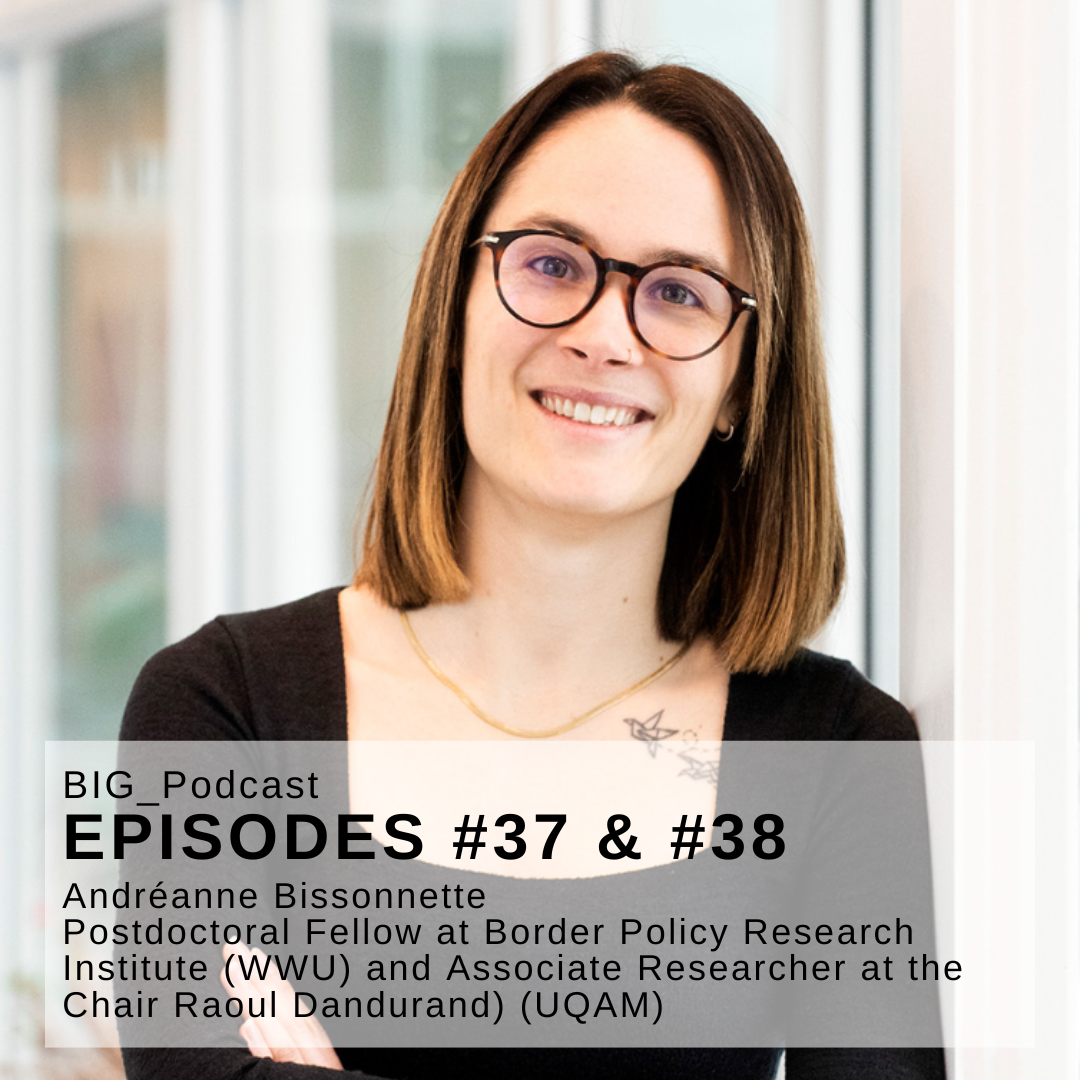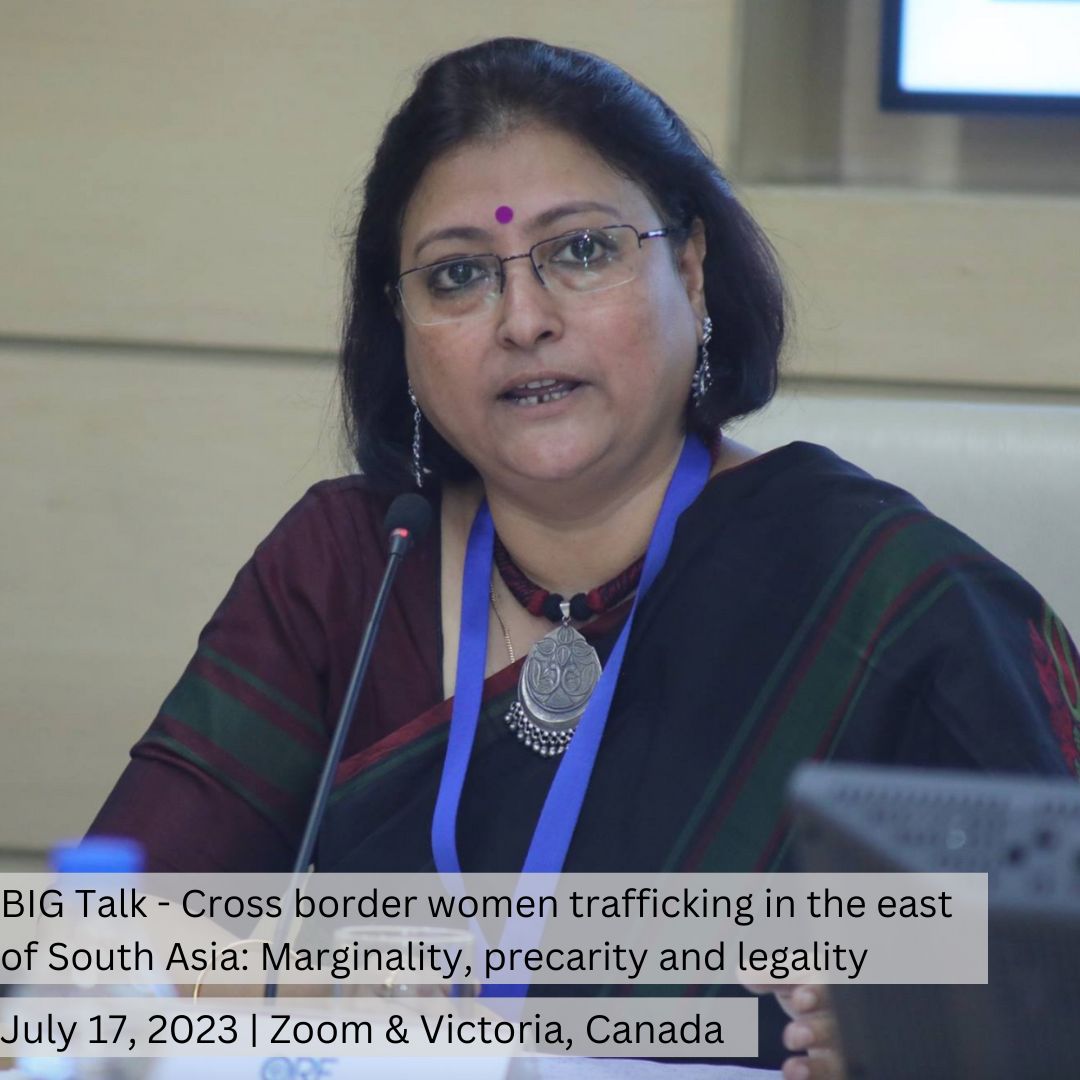BIG Podcast #37 & #38 — Borders and Gender Studies in North America
featuring Andréanne Bissonnette (Postdoctoral Fellow at Border Policy Research Institute (WWU) and Associate Researcher at the Chair Raoul Dandurand (UQAM))
In this episode, our host Ben Perrier is joined by Andréanne Bissonnette, Political Science Researcher, Postdoctoral Fellow at the Border Policy Research Institute (WWU) and Associate Researcher at the Raoul Dandurand Chair (UQAM). What are the relationships between Gender Studies and Border Studies? What does the prism of Gender Studies contribute to better understanding border policies and the effects of borders on border areas and marginalized people? In this interview, we will better understand that the relation between these two academic fields is based on the idea that borders, particularly political ones, are gendered and shaped by power dynamics. The intersection of these fields allows us to explore how borders affect individuals differently depending on their gender and identities. This podcast is divided into two parts. The first part is a General overview on Gender and Border Studies. The second part focuses on the relations between Gender Studies and Border Studies in the North American Case Study.
Listen to Part One – Episode #37 on Apple Podcasts, Spotify, or YouTube!
Listen to Part Two – Episode #38 on Apple Podcasts, Spotify, or YouTube!

Indigenous Internationalism and Kinship Diplomacy: The Relational Dimensions of Indigenous International Law
Andrew Ambers and Jeff Corntassel | Rooted: A Publication on Indigenous Law
Published in Rooted: A Publication on International Law, Vol. 3 No. 2
Enactments of Indigenous internationalism, which entail honoring relationships between nations (including plant and animal nations and other more-than-human relations) and are initiated, recalled, and reaffirmed through treaties, alliances, rights, territorial ownership and access, trade relations, and other webs of relational affiliations, contribute to and indeed constitute a diplomatic kinship meshwork. Our engagement with Indigenous internationalism is concerned with theory-building as it relates to conceptualizing kinship as a critical source of Indigenous international law and articulating how we can identify these laws and ethics in expressions of internationalism to uplift, honour, and perpetuate Indigenous sovereignty and self-determining authority. We examine how kinship meshworks order and are ordered by Indigenous international law through expressions of Indigenous internationalism, which exist beyond state borders and are functions of Indigenous diplomacies that honor Indigenous legal orders within a multiplicity of lawful and rights-bearing relations. We identify how understanding Indigenous internationalism requires overturning statist, patriarchal, and extractive visions of diplomacy, sovereignty, and international relations.
Andrew Ambers is from the Kwakwaka’wakw Nation, specifically the ‘Namgis and Ma’amtagila First Nations. He holds a Bachelor of Arts (Hons) from the University of Victoria, and he is currently a Juris Doctor (JD) and Juris Indigenarum Doctor (JID) Candidate at the University of Victoria’s Faculty of Law. Ambers contributes to various Indigenous research projects on Indigenous law, sovereignty, and Aboriginal rights, and he holds advisory role with Indigenous organizations in British Columbia. Ambers is currently working on topics related to Indigenous international law, aquatic Aboriginal Title, coastal Indigenous trade and diplomacy, Indigenous intellectual and real property rights, and the international dimensions of Indigenous rights in Canada, the United States, and beyond.
Jeff Corntassel is a writer, teacher, and father from the Cherokee Nation. As Professor and Acting Director in Indigenous Studies at the University of Victoria, his research and teaching interests focus on “Everyday Acts of Resurgence” and the intersections between Indigenous internationalisms, resurgence, climate change, gender, and community well-being. Jeff situates his work at the grassroots with many Indigenous led community-based programs and initiatives ranging from local food movement initiatives, land-based renewal projects to gendered colonial violence and protection of homelands. He is currently completing work for his forthcoming book on Sustainable Self-Determination, which examines Indigenous climate justice, food security, and gender-based resurgence.

Senior Non-Resident Fellow | Hokkaido University
Naomi Chi
Naomi Chi is a Professor and Vice-Dean at the Graduate School of Public Policy (HOPS), Hokkaido University. Her area of specialization is East Asian politics, with an emphasis on migration, demographic changes, multiculturalism, gender, ethnic and sexual minorities, as well as human security in East Asia. Her latest publications include, “Museum as ‘Lieu de Memoire’: Representation of Gender in Museum Exhibitions in East Asia,”Annals on Public Policy (Vol. 18, April 2024); Naomi Chi and Edward Boyle (eds), Nihon no Kyokai: Kokka to Hitobito no Sokatsu [Japan’s Borders: Intersection of State and People](Hokkaido University Press, 2023, in Japanese); “Chapter 11: Politics of (Mis) Trust in Northeast Asia: Social Inclusion, Empathy and Reconciliation,” in Akihiro Iwashita, Yong-Chool Ha, and Edward Boyle (eds) Geopolitics of Northeast Asia (Routledge, 2022). She also served as the President of the Association for Borderlands Studies (2021-2022).

Resident Fellow – University of Victoria
Emma Swan
Emma Swan is an interdisciplinary scholar/practitioner in the field of gender and development, with a focus on fragile and conflict affected contexts. She holds a PhD from the University of Ottawa and is a cross-appointed post-doctoral fellow at the Centre for Global Studies and the Office of the Vice-President Academic and Provost. Emma’s doctoral work explored how Western (and Orientalist) narratives related to Palestinian resistance have been integrated within liberal peacebuilding interventions and the diverse ways that men have, through a combination of cooption, resistance, and strategic adoption, navigated the resulting shifting resistance space. Her published work spans Canadian foreign policy, masculinity and resistance activism, and gender and peacebuilding. In addition to her academic work, Emma has consulted for development organizations such as Islamic Relief, Oxfam International, Action Against Hunger and UN Women.

BIG_Review 5.2
The new issue of Borders in Globalization Review is published! You’ll find cutting-edge research in border studies, extensive policy analyses, border artwork, film reviews, and book reviews. We hope you enjoy it!
Leading the issue are two innovative research articles. First, Berfin Nur Osso integrates critical analysis of European Union migration policy with artistic expressions of refugees and other migrants on the move, featuring their narratives and their paintings. Then, for our French readers, Abdoulaye Ngom presents a case study of a Senegalese family arranging for one of their sons to undertake a precarious journey to Europe, chronicling the complexity of the dilemmas and trajectories they face.
Our readership has expanded to include policy makers in various border management organizations, customs and immigration, and border regions world-wide. So in this issue’s policy section, you’ll find policy papers from South Africa, Italy, Zimbabwe, Moldova, and Australia that reflect this newly expanded scope. We are grateful for the important contributions of Jean Luc Erero, Paola Malaspina, Rwatida Mafurutu, Mihail Secu, and Jamie Ferrill and Allanah O’Hanlon. If you are reading BIG_Review and work in a border organization, your policy research is of interest to us. Do contact us—this indeed is a call for papers! This opportunity has been made possible thanks to the support of the World Customs Organization and Korea Customs.
The new issue is also rich with artwork engaging with the contradictions of borders. In the Chief Editor’s Choice Portfolio, featured on the cover, artist Laurent Reynès shares an innovative sculpture of border lines, conceptualizing the connections and hardships they engender. The work is the product of civil society collaboration with students from the University of Strasbourg, at the Center of Excellence’s 2023 Castle-talks on Narratives on Borders in Europe. In our poetry section, readers will find six poems grappling with borders, four poems by European poet Loris Ferri and two by Canadian Chad Norman. We then present a bold project of activism and artwork, the Navire Avenir, or, the Vessel of the Future, a campaign to conceptualize and actualize an appropriate life-saving response to the crisis of migrants lost at sea, brought to you by the Collectif du Navire Avenir.
Once again, our issue closes with two film and two book reviews. Sinem Arslan and Murat Çemrek recap recent cinema that dramatizes life struggles against closed borders in Turkey and Palestine respectively. Finally, Emmanuel Brunet-Jailly and Victor Konrad review recent academic publications in border studies.
Print editions are now available for purchase, and electronic copies are available for free online in Creative Commons open-access licensing. We hope you not only enjoy BIG_Review but share it as well!

Junior Resident Fellow
Anna Perez Verdia Bayne
Anna was born and raised in Mexico City, and in 2020 she moved to Victoria, BC to pursue her undergraduate degree in Sociology. Her academic interests within this field encompass access to education, immigration, and gender inequality.
Currently, she works as a research assistant at Borders In Globalization, where she is developing work on cross-border collaboration within the different continents worldwide. She also helps with data collection for the BIG Lab and Jean Monnet Database projects.

Contesting 21st Century B/Orders
European University Viadrina Frankfurt (Oder), Germany | September 6–8, 2023
A little more than two decades into the 21st century, state borders have once more moved to the center of today’s geopolitical tensions. Russia’s war against Ukraine has brought a renewed focus on border contestations, not only in Central Europe. However, at stake in the contestation of borders is not only a territorial political order or the sovereignty of particular states. The relationship of borders to orders is also crucial in determining regulations and norms that govern different forms of inclusion, recognition and exclusion of social groups within states.
Thus, societal orders require drawing borders, whether they mark nation-state or trans-state associations or mark the contested boundaries of symbolic classifications. With migration and mobility, borders not only function as filters that selectively open or close but also as “hierarchizing machines” that produce different status categories. Territorial and material borders, as well as social, symbolic and discursive boundaries and their instantiation, play an essential role in practices of power, practices through which processes of inclusion and exclusion are legitimised and hierarchically structured. Societal orders, for example, set boundaries of belonging to national communities and European or Western civilization. Both within the territorial borders of states and transnationally, they define racially and ethnically defined boundaries and mobilise hegemonic norms of gender and sexuality. At the same time, borders and societal orders, whether economic, legal, social, or cultural, are anything but stable. It is thus crucial to investigate how borders and orders are reproduced, contested, and transformed.
At the international conference “Contesting 21st Century B/Orders“, the Viadrina Center B/ORDERS IN MOTION, in cooperation with the international research networks “Borders in Globalization”– 21st Century borders (BIG) and “Transfrontier Euro-Institut Network” (TEIN), aims to discuss how societal orders in the 21st century are changing through new forms of the border and boundary drawing and to investigate how the borders of the contemporary world are shaped.
The Viadrina Center B/ORDERS IN MOTION invites you to Frankfurt (Oder) on the German-Polish border to engage in vivid discussions on this highly relevant and debated subject. From September 06-08, 2023, a range of border and order concepts will be put up for discussion: What processes of inclusion and exclusion do they condition? What grey zones and liminal spaces are created by them to what effects? Building on the aspects of marking (durability), permeability, and the formation of border zones (liminality) highlighted by the Viadrina Center B/ORDERS IN MOTION in its founding phase, we focus on the interplay of multidimensional – social, symbolic, and material – border demarcations and their significance for societal orders. Thus, we contribute to scholarly debates in which borders are described in their complexity and multiformity and conceptualized as assemblages, borderscapes, interfaces, or border textures.
A full program can be viewed on the Borders in Motion website or in PDF.

#22 BIG Podcast – “Nepal-India Border, Minorities and Cross-Border Networks”
featuring Kalpana Jha, Analyst and Researcher at the University of Victoria, BIG Graduate Student Fellow (PhD)
Country of 27 million inhabitants, in the Himalayan mountain range, Nepal shares a border with India for 1,690 km and with China for nearly 1,200 km. The majority of the inhabitants live in the south of the country (along the Indo-Nepalese border) and in the Kathmandu valley. Nepal became a republic in 2008 and the country adopted a new Constitution in 2015 which provides for a federal-type state, organized around 7 provinces which have their own assembly and executive power. This episode focuses on the State of Nepal, internal bordering processes, the marginalized people at its borders, notably the Madhesi People, and also relations with India and China.
Listen on Apple Podcasts, Spotify, and YouTube!
Kalpana Jha is a BIG Graduate Student Fellow and the author of “The Madhesi Upsurge and the Contested Idea of Nepal”. She is currently a board member on the Nepal Policy Institute (NPI) – an international policy think tank. Jha is an alumni as well as former research fellow from Tata Institute of Social Sciences (TISS), Mumbai, India. She also holds a Master’s degree in Social Work from TISS-Mumbai and a Master’s in Socio-legal studies from York University, Canada. Jha has worked extensively on identity issues, citizenship in Madhes and minorities and their status in Nepal and India. Jha has multiple publications including journal articles, book chapters, reports, newspaper articles and commentaries in the field of identity, citizenship, gender and borders. She has also worked in the Institute of Peace and Conflict Studies in New Delhi, India as a Regional and internal security intern. Jha was a former researcher at Martin Chautari and worked on a comparative study on Borderlands, Brokers and Peacebuilding in Nepal and Sri Lanka, commissioned by School of Oriental and African Studies, London, to Martin Chautari, in Nepal. She has also worked formerly in research foundations such as Social Science Baha in Nepal and Institute of Peace and Conflict Studies in New Delhi, India.

Junior Resident Fellow
Kalpana Jha
Borders in Globalization | Jean Monnet Network
Kalpana Jha is a BIG Graduate Student Fellow and the author of “The Madhesi Upsurge and the Contested Idea of Nepal”. She is currently a board member on the Nepal Policy Institute (NPI) – an international policy think tank. Jha is an alumni as well as former research fellow from Tata Institute of Social Sciences (TISS), Mumbai, India. She also holds a Master’s degree in Social Work from TISS-Mumbai and a Master’s in Socio-legal studies from York University, Canada. Jha has worked extensively on identity issues, citizenship in Madhes and minorities and their status in Nepal and India. Jha has multiple publications including journal articles, book chapters, reports, newspaper articles and commentaries in the field of identity, citizenship, gender and borders. She has also worked in the Institute of Peace and Conflict Studies in New Delhi, India as a Regional and internal security intern. Jha was a former researcher at Martin Chautari and worked on a comparative study on Borderlands, Brokers and Peacebuilding in Nepal and Sri Lanka, commissioned by School of Oriental and African Studies, London, to Martin Chautari, in Nepal. She has also worked formerly in research foundations such as Social Science Baha in Nepal and Institute of Peace and Conflict Studies in New Delhi, India.
Jha’s PhD thesis will be focused on studying Borders and bordering processes between Nepal and India. The study will explore the local cross-border networks that exists at individual and institutional level. Primarily this research will be engaging with the narratives around the changing nature of border and how local networks shape everyday bordering processes. Jha’s research seeks to trace what kind of networks exists but also how do these networks function in determining the nature of the openness of the border. Her research, embedded in the critical border studies that sees the border beyond a geographical line that divides territories but acts as a space of interaction, a bridge that brings together geographies, people and cultures.

BIG Talk – Cross border women trafficking in the east of South Asia: Marginality, precarity and legality
with Anasua Basu Ray Chaudhury (Senior Fellow, Observer Research Foundation, Kolkata) | Victoria, BC & Zoom | July 17, 2023
In Person: CFGS C168 (Sedgewick building, University of Victoria) or Zoom. The meeting will take place from 11:00AM to 12:30PM PST. Register in advance for this meeting here. Registration is free but required.
In the contemporary globalized world, trafficking of women and children and their undocumented migration have increased in both magnitude and reach, thus becoming a major human rights concern. The recent publication of the United Nations Office on Drugs and Crime (UNODC) entitled Global Report on Trafficking in Persons 2022 reveals that women account for the largest share of trafficking victims (43 per cent) of the total detected trafficked persons in South Asia. In terms of shares of detected trafficked persons in South Asia, by area of citizenship (2022) accounts for 99 percent domestic while 1 percent across border. The clandestine nature of the crime makes it difficult to gather accurate data on the number of victims. However, government and non-government reports emphasize the serious nature of the crime. The routes, methods and activities of traffickers are increasingly more organized and there is a greater penetration of organized crime syndicates into trade and trafficking of women and children within and from outside the region. While several laws in South Asian countries aim to combat human trafficking, the response level of criminal justice appears to be limited. An effective remedy must include recovery assistance, safe repatriation, reintegration, and access to information for the victims, along with appropriate legal measures to bridge existing gaps in addressing human trafficking concerns. Against this backdrop, the deliberation seeks to assess the current situation of women trafficking in the eastern part of South Asia encompassing the adjacent area of India, Bangladesh, and Nepal- the epicenter of this transnational organized crime. How is trafficking related to forced migration? What makes women and fall vulnerable to trafficking? What are the reasons for insignificant legal integration of human rights, gender and child rights in domestic anti-trafficking laws and policies in South Asia? How to strengthen cross border understanding to combat women trafficking? These are a few questions that the presentation intends to ponder upon.
Anasua Basu Ray Chaudhury, Ph.D in International Relations, is a Senior Fellow with the Neighbourhood Initiatives, Observer Research Foundation, Kolkata chapter. She is the Editor, ORF Bangla. She specialises in regional and sub-regional cooperation in South Asia, the Bay of Bengal region and the Indo-Pacific, energy forced migration and women in conflict zones. She was the coordinator of the research programme entitled “Proximity to Connectivity” and supervised/authored/co-authored a series of extensive field based reports related to connectivity and dynamics of cross border cooperative architectures. She is also the recipient of the Public Service Broadcasting Trust Senior Media Fellowship (Prasar Bharati,2007) and the Kodikara Award (Regional Centre for Strategic Studies, Colombo, 1998–99). She was the Visiting Fellow (2012) at The Maison des Sciences de I’Homme, Paris. She is a member of the Editorial Board of international peer reviewed journals namely Borders in Globalization Review (Centre for Global Studies, Canada) and Journal for Indian Ocean Research (Routledge, New Delhi).
Her recent publications include Caste and Partition in Bengal: The story of Dalit refugees,1946-61 (OUP, UK, 2022); BIMSTEC: Mapping Sub-regionalism in Asia (Co-edited Routledge:UK, 2022); New futures of BIMSTEC: connectivity, commerce and security (co-edited Routledge: UK, 2021), India– Myanmar Borderlands: Ethnicity, Security and Connectivity (co-edited/ Routledge, UK, 2020); Connecting Nations: India and Southeast Asia (coedited/ Primus, New Delhi, 2019); The State of Being Stateless in South Asia (co-edited/ Orient Black Swan: New Delhi, 2015); Women in Indian Borderlands (co-edited/ Sage Publications, New Delhi, 2011).

